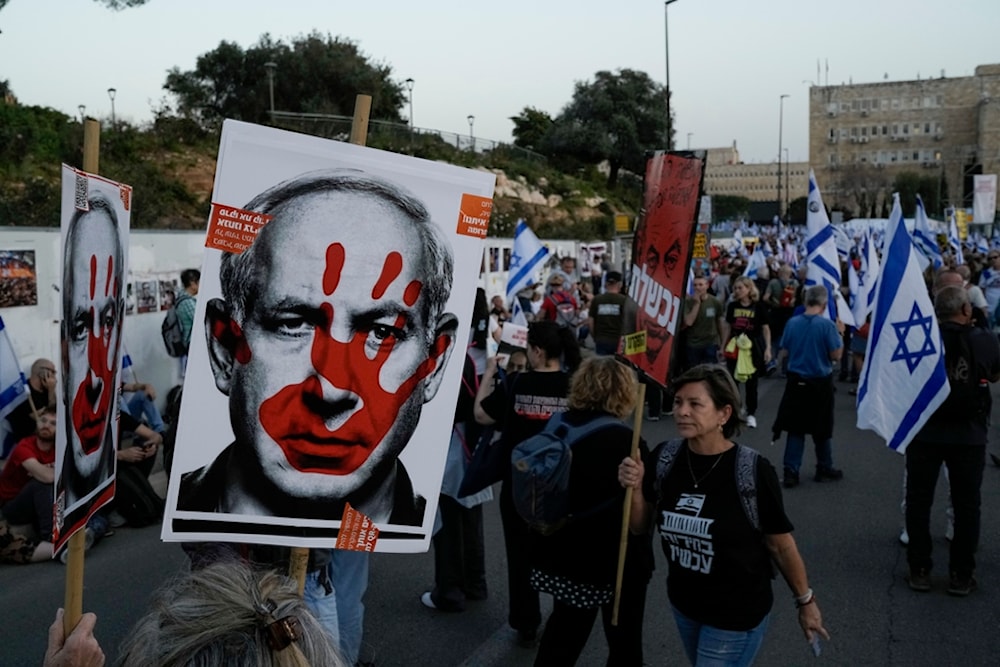'Israel's' problems lie in Israeli society, not just Netanyahu: FP
Israeli settlers' focus on ousting Israeli occupation Prime Minister Benjamin Netanyahu obscures deeper complicity in the prolonged occupation and genocide in the Gaza Strip, according to a Foreign Policy report.
-

Israeli occupation settlers take part in a protest against Israeli PM Benjamin Netanyahu's government outside of the Knesset, in occupied al-Quds, occupied Palestine, Sunday, March 31, 2024. (AP)
"Netanyahu is a convenient scapegoat," Mairav Zonszein, the senior "Israel" analyst at the International Crisis Group, said in her report published for Foreign Policy. The report, now titled, "The Problem Isn’t Just Netanyahu, It’s Israeli Society," was initially titled "Netanyahu Is a Scapegoat. A Callous Israel Is the Problem."
Zonszien made it clear, in all but name, that in "Israel" the problem is occupation, noting that the "focus on Netanyahu is a convenient distraction from the fact that the war in Gaza is not Netanyahu’s war, it is Israel’s war."
Pointing fingers at Netanyahu, according to her, "eclipsed the fact" that "that when it comes to Israeli policies on Gaza in particular, and the Palestinians in general, many Israelis are broadly aligned with Netanyahu," adding, "By a large margin they support the current military campaign in Gaza and the government’s goal of destroying Hamas, whatever the human toll for Palestinians in the Gaza Strip."
"For years, Israelis have been able—through military and economic domination—to disregard the single most pressing issue facing the country—its control over millions of Palestinians," she said, emphasizing that Operation Al-Aqsa Flood only “opened the floodgates even further on what is considered acceptable."
Israeli Consensus on Gaza Policy
The "Israeli crisis," as it has been described by multiple news outlets, in the Foreign Policy piece was considered an existential war for the Israeli occupation. Even more accurately, the report dubbed it a "war of no choice" wherein "Hamas must be destroyed as a matter of Israeli survival."
Most significantly, however, was that the article affirmed that "the threat of imminent famine in Gaza has not provoked opposition" to the Israeli occupation’s genocide in the Gaza Strip. In fact, "88% of Jewish Israelis polled in January believe the astounding number of Palestinian deaths, which had surpassed 25,000 at the time, is justified," and that "a large majority" even "thinks that the Israel Defense Forces [Israeli Occupation Forces] is using adequate or even too little force in Gaza."
As for the US-proposed two-state solution in which the Palestinian Authority would allegedly take over the Gaza Strip and in return "Israel" would get a normalization agreement with Saudi Arabia, a proposal that is far from being "real", the Foreign Policy report said "the outcome of such a process would depend on how both Israelis and Palestinians respond to a cease-fire over time, and how much the United States and other actors would be prepared to push to make it happen," stressing, "For now, Israelis are largely not calling for a ceasefire."
The US proposal according to Zonszein also failed to explain what happens to Hamas, as it is unlikely it would disappear; it also failed to show what concessions would be made by the Israeli occupation and highlighted that it is "unclear if the PA can be reformed sufficiently to regain legitimacy among Palestinians."
As for the Oslo version of the two-state solution, the report mocked it saying, "You don’t need a poll to discover that support for a two-state solution, much less for Palestinian basic rights of freedom and self-determination, has been steadily declining among Jewish Israelis in recent years, and today is probably the lowest it has ever been."
Israeli occupation protests: Not against the war, but against Netanyahu
Regarding the Israeli occupation government divide, and the ongoing protests in "Tel Aviv", Zonszein acknowledged that this divide practically pertains to a power struggle and is devoid of any disagreements on fundamental policies vis-à-vis the cause of Palestine.
She underscored that the recent protests which involved thousands of settlers did not, focus on protesting the ongoing genocide nor have they called for a cease-fire. Zonszein said "They are not protesting Israel’s killing of unprecedented numbers of Palestinians in Gaza or its restrictions on humanitarian aid that have led to mass starvation. (Some right-wing Israelis even go further by actively blocking aid from entering the strip.) They are certainly not invoking the need to end the military occupation, now in its 57th year [referring to the 1967 Sex-Day war]."
Instead, Zonszein said, "They are primarily protesting Netanyahu’s refusal to step down and what they see as his reluctance to seal a hostage deal."
The report even suggested that the poster saying "we are not our government" raised by Israeli settlers in "Tel Aviv" and occupied al-Quds during anti-Netanyahu demonstrations, allegedly echoing the US-made distinction between the “Netanyahu government and its people,” was "misleading".
In conclusion, Zonszein suggested, "Putting all their energy into ousting Netanyahu" kept settlers from "assuming responsibility for their complicity in the prolonged military occupation, the destruction of Gaza, and their failure to outline a genuine political path out of the current crisis,” reaffirming that "Netanyahu is a convenient scapegoat."
Read more: Israeli media mocks Netanyahu's plot to 'contain Hamas' in a Rafah

 5 Min Read
5 Min Read








